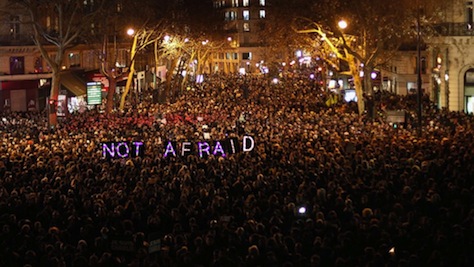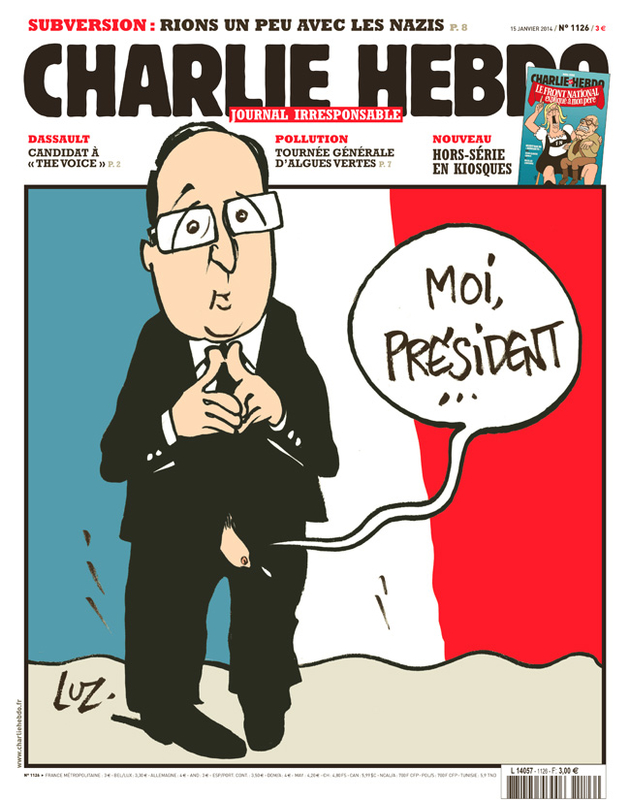Even before the gruesome murder of 12 civilians today in the name of Islam, France wasn’t exactly having the best run. ![]()
Nicolas Sarkozy came to power in 2007 amid promises of rupture and reform, signaling youthful, nervous energy that would transform France’s public sector after the somnolent 12-year reign of the genteely corrupt Jacques Chirac. While he did manage to raise the retirement age and make some tweaks, the full-throated rupture never quite arrived, and his administration amounted to an embarrassing series of bling bling moments, capped off by his whirlwhind romance and marriage to singer Carla Bruni. It’s still hard not to cringe at the photos of Sarkozy and Bruni at Disneyland Paris just months after his inauguration or the thought of Sarkozy lapping up the excesses of wealth on one of Silvio Berlusconi’s yachts.
François Hollande easily defeated his reelection bid in May 2012 with a promise to boost growth and employment in policy matters and to be a ‘normal’ president in, ahem, more personal matters. France got neither from its new president, whose popularity rating today is stuck in the high 10s or low 20s, depending on the poll. Even before the 2012 election campaign ended, his then-consort Valérie Trierweiler had already gotten into a spat on Twitter attacking Hollande’s former partner of three decades, Ségolène Royal, herself a former presidential candidate and a top figure within the Socialist Party. That presaged the ridiculous split between the two earlier this year, catalyzed by the impotent image of Hollande sneaking out of the Elysée Palace on a scooter for a tryst with French actress Julie Gayet. Charlie Hebdo, it should be noted, ruthlessly mocked Hollande for his shortcomings as well as organized religion of all faiths:
If the United Kingdom held the ‘sick man of Europe’ crown in the 1970s and Germany held it in the 1990s before its labor market reforms and amid the tectonic growing pains of reunification, France would hold clear title to that position today, if not for so many other pretenders across Europe, each struggling under the strains of joblessness, economic malaise, depopulation and precarious public debt. After starting to fall in 2013, France’s unemployment rate leapt back to record levels (10.4%) at the end of 2014. Short of a contentious battle to legalize same-sex marriage and his soon-forgotten success from decisive military action to liberate northern Mali from jihadists, Hollande has precious few policy victories to show for his administration.
It might be more accurate to call France the ‘invisible man’ of Europe.
While Germany has emerged, for now, as the sole engine of Europe, its chancellor Angela Merkel dictating fiscal policy to the rest of the European Union and its central bankers vetoing the kind of aggressive eurozone-wide quantitative easing that could reverse deflationary trends, you don’t hear much talk about the vaunted Franco-German axis anymore. British prime minister David Cameron, who’s courting disaster in his promise to hold a referendum on his country’s EU membership, has more influence on the German chancellor than Hollande or even his relatively right-leaning prime minister Manuel Valls, who leads Hollande’s second government in three years. Whether it’s banking unions or Russian aggression in eastern Europe or eurobonds or the risk of a far-left Greek government in elections later this month, no one gives a hoot about what Hollande has to say on EU matters — or anything else for that matter.
As Sarkozy, plagued by legal challenges, plots a center-right comeback and Hollande’s center-left Parti socialiste (PS, Socialist Party) loses more credibility by the day, the xenophobic, far-right Marine Le Pen and the Front national (FN, National Front) are basking in the victory of emerging as the top-placed party in last May’s European elections. Polls for the first round of the 2017 presidential election routinely place Le Pen leading or tied with all the major contenders, including Sarkozy and former foreign minister Alain Juppé, on the right, and Hollande and Valls, on the left. But you could see the rumblings a decade ago, when the French single-handedly ended the push (led by former French president Valéry Giscard d’Estaing, no less!) to draft a constitution for the European Union, when voters rejected the constitutional treaty in a May 2005 referendum.
We’ve all read too many stories in the past decade or so about the tristesse or the ennui afflicting modern 21st century France.
So it’s understandable that so many commentators looked at the horrific attack on the Charlie Hebdo office on Tuesday and worried that it would unleash a wave of anti-Muslim sentiment, fueling the insular nationalism that drives Le Pen and the French far right, which has responded to France’s collective economic slump by lashing out at the political elite, at immigration and at the European Union. Continue reading In Charlie Hebdo massacre, French values find a rallying point

